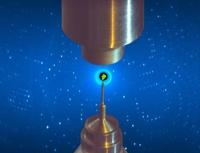Speaker
Description
Biological samples often show a sufficiently broad spectral range where light absorption does not play a dominant role. This enables in situ sample control using dynamic and static light scattering techniques. Many biological samples undergo a slow aggregation process during the comparatively long neutron data collection times. If the aggregates are staying few in number and/or if their form factor has decayed enough in the relevant q-range, the neutron measurement can be continued. If not, a fresh sample should be used. Dynamic or static light scattering as an in situ technique offers an elegant way to get information on sample aggregation state with an update rate on the order of minutes during the neutron beam time.
Candidates for neutron instruments to be equipped with an in situ light scattering set up are small angle scattering, spin echo, time-of-flight and backscattering instruments operating sample environments near or at room temperature. We routinely provide in situ dynamic light scattering with one fixed scattering angle at the instrument KWS-2 at MLZ to interested users. For the Jülich spin echo spectrometer J-NSE we have developed a temperature-controlled sample environment which includes two laser colours and three light scattering angles. This not only enables dynamic but also static light scattering at six different q-values. This contribution discusses the experiences made with these in situ set ups and looks into future developments and improvements.

